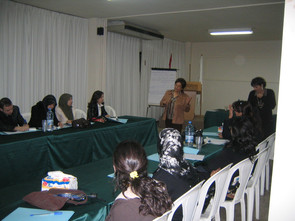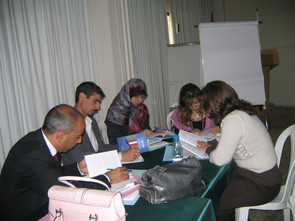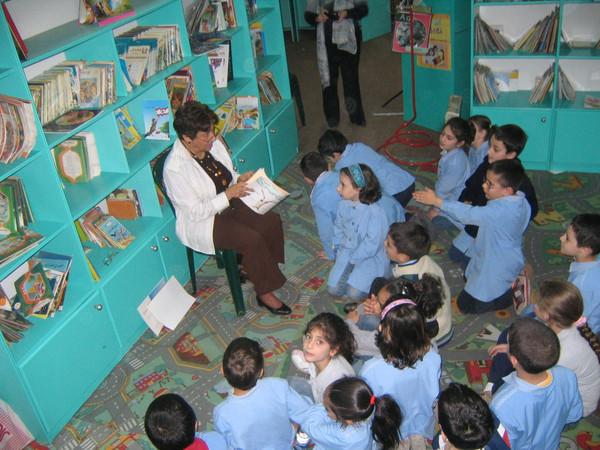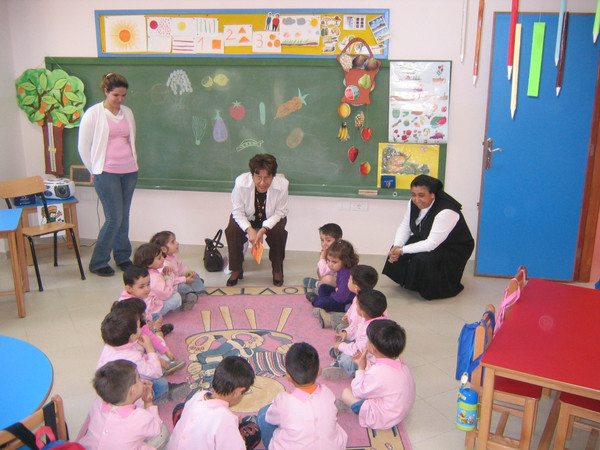IBBY Children in Crisis: Lebanon
back
Conflict Management for Traumatized Children of War in Lebanon
The project on Conflict Management for Traumatized Children of War in Lebanon has been an interesting project indeed. Implementing it was a challenging task where many difficulties were encountered for the lack of security in the areas where we were working, but the results achieved are rewarding. It took sometime to get started because of the mass destruction left by the war and the delay in starting the school year, 2006-2007. Once we started we trained thirty two teachers from 16 different schools that I reported on in the first progress report.
Recruitment and Training
In November of the school year 2007-2008, the Lebanese Section of IBBY (LBBY), in cooperation with the Ministry of Social Affairs, reestablished contacts with the schools after the summer break of June to October. The political situation was less turbulent than the previous year. Contacts went on more smoothly and 22 new teachers and two social workers from 18 schools and two social centers were recruited for training. Training took place on December 6th and 7th in the Hadath Social Center for Training that belongs to the Ministry of Social Affairs.
Training went on smoothly and teachers and social workers received the project manuals along with the work books for children, a total of 1,800 books. They were also given lists of story books they can use to supplement the project. The puppet show was presented to 800 children recruited from the schools that are implementing the program. Each child was given a book and the 18 schools were given 50 story and science books each for their library.
Teachers who took part were excited about the project and they all promised to implement it in their respective schools. This was the condition to accept them for training. Some school principals asked if we could train more of their teachers in the skills we were teaching. We promised that we will try to find the means to do that after we are through with this project.
Contacts with the Ministry of Education had been done last year to get approval for working with public schools. This year we went a step further by asking the Unit of Guidance and Counseling in the Ministry of Education about training their Educational Counselors, who have access to all the elementary schools in the country, in the skills we were presenting to teachers in selected schools. Our argument was that they would be able to train the teachers in all the elementary public schools across the country. It took a few months to convince all those concerned and get all the necessary permits for the task. Finally we were given approval to proceed.
With the blessings of the Director General of Education and the assistance of the Director of the Unit of Guidance and Counseling a two day training workshop took place in the Ministry of Education on the 27th and 28th of February, 2008. The whole team of thirty three educational advisors across the country took part in the workshop. They were given the manuals, the work books and the lists of story books that could be used to supplement the project, along with the names of publishing houses where these books may be found. Each Counselor also received a set of 25 teachers' manuals and 100 workbooks. The Counselors were very receptive and happy to get all this and especially the lists of story books that they will use in different activities and recommend to the school librarians they work with.
A project of this nature on the country level needs a larger budget than the one we have but now it is the government's responsibility to pick it up from here. We planted the seeds and it is up to them to nourish it and see it grow. They are aware of the great need for this kind of a project so I hope that funds would be secured to implement it on a larger scale.
Supervision
Telephone calls and spot visits were made to the schools that are implementing the project. It is rewarding to see that most of them are trying their best to provide time for it despite their demanding schedules. Most of the schools are providing one hour a week but some are managing to give two hours. Another interesting observation is the fact that some of the schools are involving parents to some extent in helping to solve the problems that their children are facing.
The educational counselors are also working hard with the schools. I asked them to submit a report at the end of the school year, in June, to evaluate the impact of the project. We provided them with a form to fill indicating any changes in children's behavior. Preliminary reports from teachers and supervisors indicate positive progress in social relations and individual behavior.
Conclusion
It is rewarding to achieve successful results after hard work. It is true that getting permits to get started and convincing those in decision making positions to believe in the value of this kind of a program was tough, but it was worth the effort. The feedback we are getting from teachers is encouraging indeed. They can see improvement in children's behavior which gives them personal satisfaction. They feel that through their help the children are changing their unacceptable behavior in solving problems and replacing it with more socially accepted ways. They realize that they are protecting these children from delinquency and other major problems in the future.
I would like to do much more because the needs in the country are great but I keep reminding myself that it is better to light a candle than curse the darkness.
Submitted by Julinda Abu Nasr
LBBY
Lebanon, April 2008





